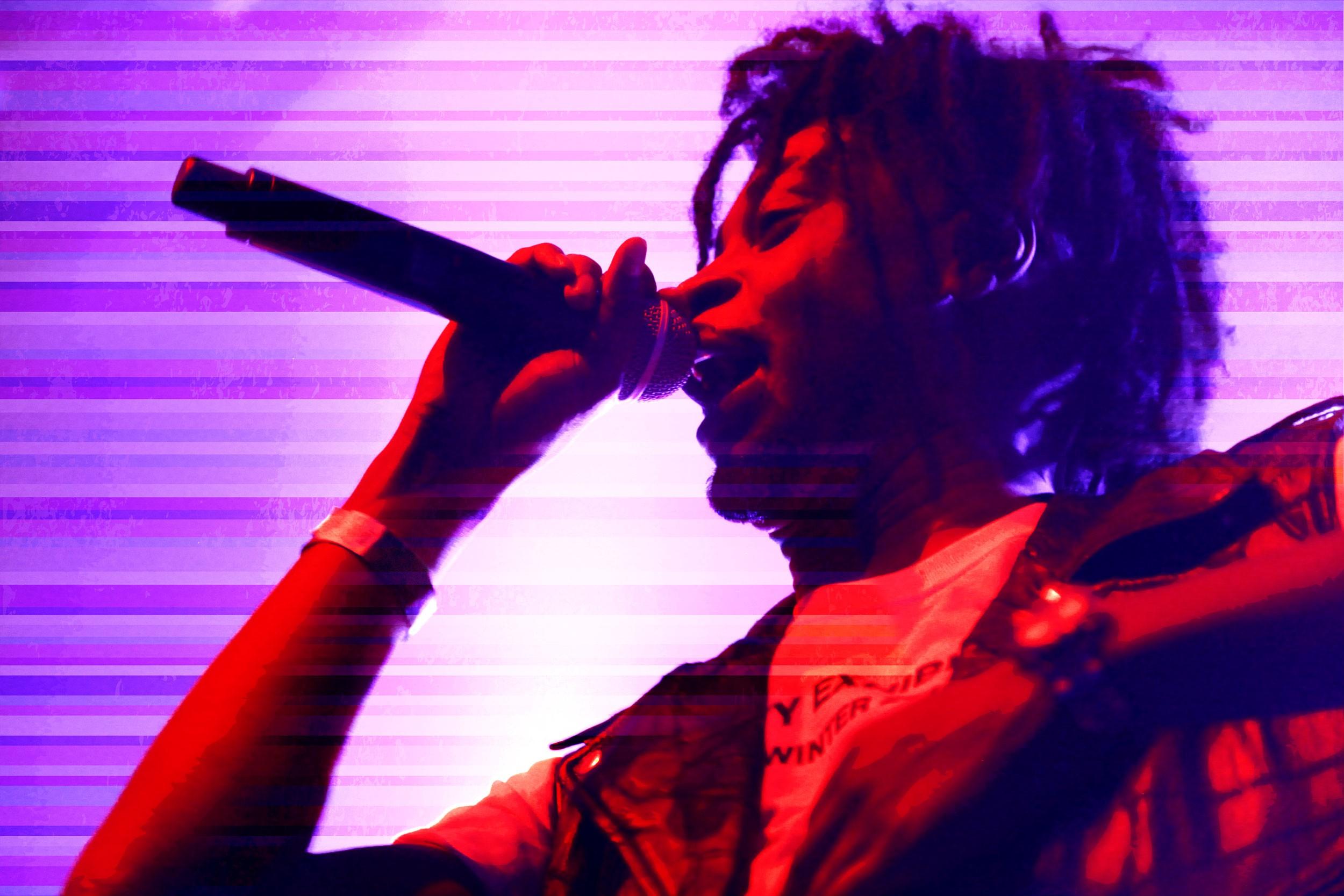
Here’s a two-word, verbal Rorschach test for you: “Kush Coma.” Tragedy or comedy? Hospital room or rave tent? Cautionary tale or aspirational anthem? With Danny Brown, braying Detroit rapper extraordinaire, you get to choose, but he does not. He suffers for his right to party, and parties for his right to suffer. He is Dionysus and Sisyphus both, pushing an Ecstasy pill up the mountain. He contains multitudes. Specifically, he contains a pharmacy, a chemistry lab, and a vast, verdant field in Colorado. It’s hilarious. It’s not funny at all. The kids just love it. The man himself remains profoundly conflicted, brought low and yet eternally, spectacularly high.
Brown broke out in 2011 with XXX, a vicious and flamboyantly hedonistic mixtape whose triple-entendre title suited him perfectly, an ascendant 30-year-old burnout pounded by exhilarating waves of sex and drugs. His voice hits you first, loopy and wild, like Chris from Family Guy on a three-week bender; his taste in beats tends toward the dissonant and woozy and art-damaged. XXX had jokes. (“I’m higher than Swizz Beatz’s hairline.”) It had ludicrous boasts. (“My hoes got toes in expensive high heels / Your hoes’ toes is fucked, beauty-supply sandals.”) It had oral-sex manifestos. (Forget it.) The slowest, softest, most shattering track was called “Party All the Time.” The stickiest chorus went “Blunt after blunt after blunt after blunt after blunt after blunt,” fierce and defiant and desperate. If you had to sum up the whole record in a line, “Could fuck you for an hour ’cause I can’t feel” works almost too well.
Next came 2013’s Old, which is where you’ll find “Kush Coma,” radiating both triumphant music-festival warmth and desolate locked-bedroom frigidity. It was the climax to an EDM-laced back half that solidified Brown’s rep as both a sobering folk hero and a drugged-up, unwilling mascot. The adulation both excites and repulses him. His noisy and unsettling new album, out this week, is called Atrocity Exhibition, named for an impenetrable J.G. Ballard book and a piercing Joy Division song wherein frontman Ian Curtis laments his fate as a rock-star freak show: “For entertainment they watch his body twist / Behind his eyes, he says, ‘I still exist.’” Brown has always been a singular, acquired-taste sort of dude, but this is his densest, gnarliest work yet, harder to love than XXX but still worth the effort, and delivered with such verve and charisma that you barely register how depressing it is. As Curtis put it, “The sickness is drowned by cries for more.”
We kick off with a song called “Downward Spiral.” We are firmly in the Ol’ Dirty Bastard–Lil Wayne tier here, amid other chemically addled clown princes constantly flirting with outright tragedy, making transcendent art that comes at an enormous personal cost, shaming us even as it exhilarates us. Brown’s just a little further out there. With his gutter-peacock haircut and lewdly triangular tongue and fiendish, gap-toothed grin, Brown has a punk rocker’s visual zeal and a wandering musical ear: Early Atrocity press listed “Raekwon, early Björk, Joy Division, Talking Heads, and System of a Down’s Toxicity” as prime influences. So you’re braced for an industrial Nine Inch Nails dirge, but what you get sounds like a controlled freakout to a groggy Can jam, prog rock as choking spiritual fog.
Opening lines: “I’m sweatin’ like I’m in a rave / Been in this room for three days.” His teeth grind to an uneasy anti-chorus of “I gotta figure it out / I gotta figure it out.” The second verse begins by both celebrating and dismissing his success: “Everybody saying, ‘You got a lot to be proud of’ / Been high this whole time, don’t realize what I done.” The cries for more drowned by the sickness.
Things get worse, and all the more jarring and alluring. “Ain’t It Funny” is harrowing, a horn-skronking death march full of straitjackets and runny noses that concludes, “Might need rehab, but to me that shit pussy.” “Golddust” is another bracing, psych-rock freakout with quick bursts of humor amid the carnage: “Mimosa for breakfast / With a thick ho from Texas.” And “Pneumonia” has the sharpest, most conventional hook — a terse chant of “Made 30 bands in 30 minutes / Before I count it I done damn near spent it” — but the anvil-chorus beat makes it sound like he’s rapping along to a grisly construction-site accident. Brown has never pretended to be in the stadium-pop business — there’s an odd, unseemly Iggy Azalea diss crammed in at the record’s very end — but he’s no longer even willing to compromise with himself.
This is dark, bold, challenging stuff, and excellent use of just about as high a profile as an outré rapper can have. As high a budget, too: Atrocity is a sample-heavy stew that reportedly cost Brown north of $70 grand, a figure he is proud to cite. That’s money well spent, even if you’ve got no idea where it went, exactly. (The ecstatic raga-rock shouters who anchor the frantic “Dance in the Water” hopefully got a healthy cut.) Production comes from frequent cohort Paul White, with drop-ins from U.K. drone-bomber Evian Christ, canonized tinkerer the Alchemist, and Danny’s fellow Detroit luminary Black Milk. His attempts at more conventional hooks and hookups — South African art-soul singer Petite Noir on “Rolling Stone,” breathy R&B enigma Kelela on “From the Ground” — don’t work quite as well, but while a collaboration with Cypress Hill’s B-Real called “Get Hi” is the very definition of “redundant,” the soothing brushed-cymbal beat might hypnotize you anyway. At least he’s making some friends.
Which brings us to “Really Doe,” this record’s only chance at a breakout hit by design, a grimy, xylophone-driven posse cut with Ab-Soul, Earl Sweatshirt, and Kendrick Lamar, a menacing feast of BARS. It’s fantastic, and proves that on top of everything else, Brown is one of the few rappers who can hang with a rappity-rapping lineup that fearsome. For all his deep-thinking abstractions, he’s a classicist in his way, in thrall to Nas and André 3000 in equal measure. (“Today” mixes in lyrical bits of OutKast’s “B.O.B. (Bombs Over Baghdad),” but he’s standing in the crater, not leering from the jet.) This record’s at its best when his apocalyptic worldview expands even slightly beyond whatever bedroom he’s currently barricaded in: Atrocity Exhibition, of course, is also the perfect album title for a rapper hailing from the disaster-porn capital of America.
On XXX, those grim origins manifested in the breaking-and-entering tragedy “Scrap or Die” or the bracing “Fields,” with its chorus of “And where I live / It was house, field, field / Field, field, house / Abandoned house, field, field.” All you’d ask for now is sightly more of that civic pride/shame, given how vividly Brown can deliver it. “Tell Me What I Don’t Know” is a petty, street-crime travelogue braced by bleeps from a lonely space station, startling football-coach whistles, and clattering drums that only stumble in halfway through. Brown’s voice is low, muted, somber — you barely recognize him, and can barely reconcile him with the seething court jester the rest of Atrocity Exhibition suggests he fears he’s still playing. He just cited it as his favorite song he’s done so far. But from there you can practically hear all the deadbolts lock, and he’s fully barricaded again.
You cling to the jokes here: “I’m Coltrane on Soul Plane / Propane flow game / Bitches know my name from Cancun to Spokane” is a good one. But they catch in your throat, and they all but die in his. Will he ever emerge from this coma? Would you still love him if he did?

